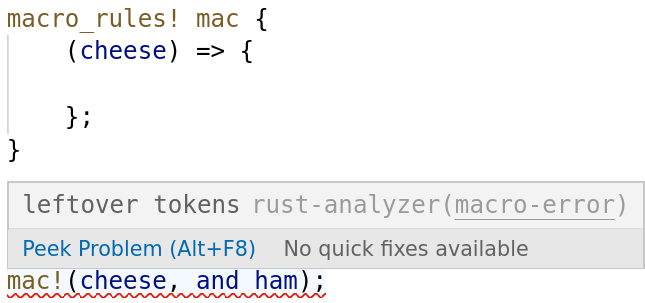| Commit message (Collapse) | Author | Age | Files | Lines |
|---|
| | |
|
| |
|
|
|
|
|
|
|
|
|
|
|
|
|
|
|
|
|
|
|
|
|
| |
The idea here is to eventually get rid of `dyn Diagnostic` and
`DiagnosticSink` infrastructure altogether, and just have a `enum
hir::Diagnostic` instead.
The problem with `dyn Diagnostic` is that it is defined in the lowest
level of the stack (hir_expand), but is used by the highest level (ide).
As a first step, we free hir_expand and hir_def from `dyn Diagnostic`
and kick the can up to `hir_ty`, as an intermediate state. The plan is
then to move DiagnosticSink similarly to the hir crate, and, as final
third step, remove its usage from the ide.
One currently unsolved problem is testing. You can notice that the test
which checks precise diagnostic ranges, unresolved_import_in_use_tree,
was moved to the ide layer. Logically, only IDE should have the infra to
render a specific range.
At the same time, the range is determined with the data produced in
hir_def and hir crates, so this layering is rather unfortunate. Working
on hir_def shouldn't require compiling `ide` for testing.
|
| |\
| |
| |
| |
| |
| |
| |
| | |
8977: internal: minor `TokenMap` cleanups r=jonas-schievink a=jonas-schievink
bors r+
Co-authored-by: Jonas Schievink <[email protected]>
|
| | | |
|
| |/
|
|
|
| |
Lets steal this good naming from Roslyn before I forget about it yet
again.
|
| | |
|
| | |
|
| | |
|
| | |
|
| | |
|
| | |
|
| | |
|
| |
|
|
|
| |
Using `Option` arguments such that you always pass `None` or `Some` at
the call site is a code smell.
|
| |
|
|
| |
only declarative macros have def-site token map
|
| | |
|
| |\
| |
| |
| |
| |
| |
| |
| |
| | |
8727: minor: use standard import style r=matklad a=matklad
bors r+
🤖
Co-authored-by: Aleksey Kladov <[email protected]>
|
| | | |
|
| |\|
| |
| |
| |
| |
| |
| |
| |
| | |
8726: internal: reduce visibility r=matklad a=matklad
bors r+
🤖
Co-authored-by: Aleksey Kladov <[email protected]>
|
| | | |
|
| |/ |
|
| | |
|
| | |
|
| |
|
|
| |
This reverts commit 7e78aebc8fbbb4043d62949681e4d700f1a2ec46.
|
| | |
|
| |
|
|
| |
It could never return `None`, so reflect that in the return type
|
| | |
|
| | |
|
| | |
|
| | |
|
| | |
|
| | |
|
| | |
|
| | |
|
| | |
|
| | |
|
| | |
|
| | |
|
| | |
|
| | |
|
| | |
|
| | |
|
| | |
|
| | |
|
| | |
|
| | |
|
| | |
|
| | |
|
| |\
| |
| |
| |
| |
| |
| |
| |
| |
| |
| |
| |
| |
| |
| |
| |
| |
| |
| |
| |
| | |
6645: Publish diagnostics for macro expansion errors r=matklad a=jonas-schievink
This adds 2 new diagnostics, emitted during name resolution:
* `unresolved-proc-macro`, a weak warning that is emitted when a proc macro is supposed to be expanded, but was not provided by the build system. This usually means that proc macro support is turned off, but may also indicate setup issues when using rust-project.json. Being a weak warning, this should help set expectations when users see it, while not being too obstructive. We do not yet emit this for attribute macros though, just custom derives and `!` macros.
* `macro-error`, which is emitted when any macro (procedural or `macro_rules!`) fails to expand due to some error. This is an error-level diagnostic, but currently still marked as experimental, because there might be spurious errors and this hasn't been tested too well.
This does not yet emit diagnostics when expansion in item bodies fails, just for module-level macros.
Known bug: The "proc macro not found" diagnostic points at the whole item for custom derives, it should just point at the macro's name in the `#[derive]` list, but I haven't found an easy way to do that.
Screenshots:


Co-authored-by: Jonas Schievink <[email protected]>
|
| | | |
|
| |/ |
|
